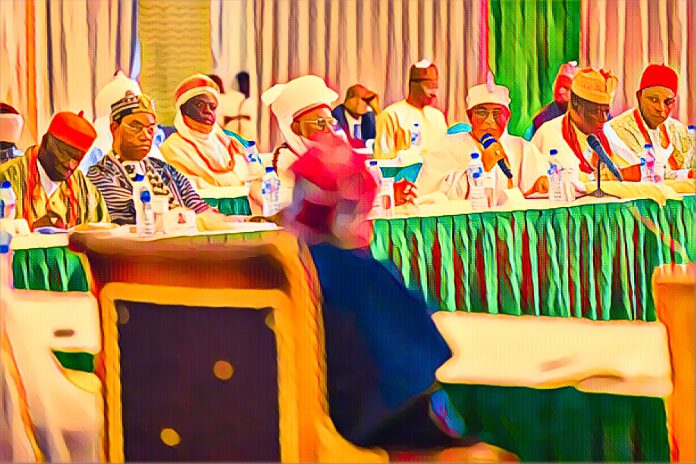KEY POINTS
- Traditional rulers blend cultural heritage with modern governance systems.
- They drive socio-economic development through advocacy and community mobilization.
- Legal and resource challenges limit their influence in governance.
Traditional rulers, including chiefs, kings, and emirs, have historically been central to governance in African societies. Despite the emergence of modern political systems, they continue to exert influence, particularly in local governance. Their roles have evolved to accommodate contemporary societal needs, yet their impact remains significant in fostering cultural preservation, socio-economic development, and community cohesion.
Traditional rulers bridge ancient customs with modern local governance
Traditional rulers in Africa have roots that date back centuries. Before the advent of colonial rule, they were the cornerstone of governance, wielding legislative, judicial, and executive powers. In many societies, they resolved disputes, enforced laws, and oversaw communal welfare.
During the colonial era, their authority was co-opted into systems like indirect rule. For example, in Nigeria, British colonial administrators relied on traditional rulers to implement colonial policies, often modifying their roles to serve imperial interests.(Source) Post-independence, their roles were reduced in many countries, yet they remained influential, particularly in rural and semi-urban areas where they often act as intermediaries between the people and modern governments.
Today, traditional rulers serve as cultural custodians, preserving customs and traditions while advising local governments on sensitive cultural and community matters. They act as a bridge between ancient practices and contemporary governance frameworks, ensuring that societal values are upheld.
The evolving roles Of traditional rulers in community development
In local governance, traditional rulers play a multifaceted role. They are not merely figureheads but active agents of change, contributing to socio-economic development.
- Advisory Roles
Traditional rulers frequently serve as advisers to local governments, offering insights on cultural practices, land disputes, and community development projects. In countries like Ghana, the National House of Chiefs provides formal channels for traditional leaders to engage with the government on legislative and policy matters. - Conflict Resolution
Dispute mediation remains a significant function. Traditional rulers are often the first point of contact for resolving conflicts, including land disputes and family issues, helping maintain peace in their communities. In Nigeria, the Emir of Kano has mediated tensions between religious and ethnic groups, underscoring the importance of traditional authority in maintaining societal harmony. - Socio-Economic Development
Traditional rulers often mobilize their communities for development projects. For instance, in rural areas of South Africa, traditional leaders play a role in facilitating access to government-funded infrastructure projects. They also advocate for educational initiatives and public health campaigns, boosting literacy and health outcomes in their jurisdictions. - Cultural Preservation
As custodians of culture, traditional rulers uphold indigenous practices, festivals, and rituals, fostering a sense of identity and unity within their communities. Their influence extends to promoting local crafts and industries that preserve cultural heritage while generating economic opportunities.
Challenges and future prospects for traditional rulers in governance
Despite their important contributions, traditional rulers face numerous challenges in executing their roles.
- Legal and Constitutional Limitations
Modern legal frameworks often restrict the powers of traditional rulers. For example, in Nigeria, traditional leaders have no formal constitutional roles but serve as advisers, limiting their direct influence on policy-making. - Political Interference
Political entities sometimes exploit traditional institutions for personal or partisan gain. This interference undermines the autonomy of traditional rulers and erodes public trust in their leadership. - Resource Constraints
Many traditional rulers operate with limited financial and infrastructural support, hindering their ability to implement community projects effectively. This lack of resources reduces their capacity to address pressing local issues.
Case studies: Traditional rulers’ impact across Africa
Nigeria:
Traditional rulers like the Oba of Lagos and the Emir of Kano have played significant roles in fostering peace and facilitating development. The Kano Emirate Council, for example, actively engages in education and healthcare advocacy, emphasizing the importance of traditional institutions in modern governance.
Ghana:
The chieftaincy system in Ghana integrates traditional rulers into the formal governance framework. The National House of Chiefs enables chiefs to contribute to policymaking and development planning, particularly in rural areas.
South Africa:
Traditional leaders in South Africa are constitutionally recognized and play key roles in rural governance. The National House of Traditional Leaders advises the government on laws affecting traditional communities, bridging the gap between customary and modern governance.
Future prospects for traditional rulers
The future of traditional rulers lies in harmonizing their roles with modern governance structures. Strategies for this integration include:
- Capacity Building: Equipping traditional rulers with training in governance, conflict resolution, and resource management.
- Policy Frameworks: Establishing legal structures that define and enhance their roles within local government systems.
- Financial Empowerment: Providing resources to enable traditional rulers to implement community projects effectively.
In conclusion, traditional rulers remain vital to local governance in Africa. Their ability to merge cultural authority with modern governance positions them as indispensable stakeholders in fostering peace, preserving heritage, and driving socio-economic progress. Addressing the challenges they face will ensure they continue to thrive as custodians of tradition and agents of development.



